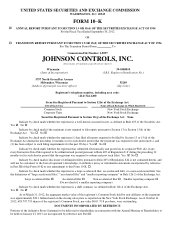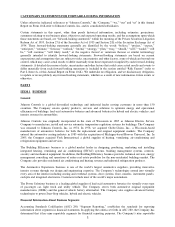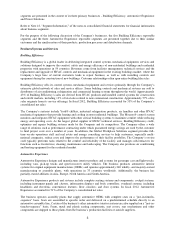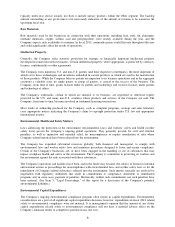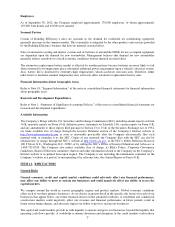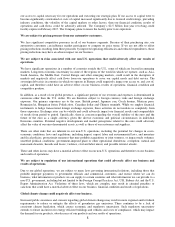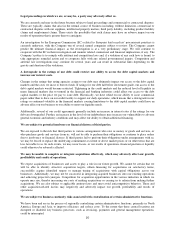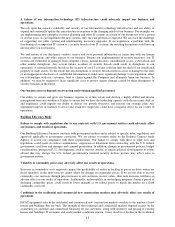Johnson Controls 2012 Annual Report Download - page 11
Download and view the complete annual report
Please find page 11 of the 2012 Johnson Controls annual report below. You can navigate through the pages in the report by either clicking on the pages listed below, or by using the keyword search tool below to find specific information within the annual report.
11
A failure of our information technology (IT) infrastructure could adversely impact our business and
operations.
We rely upon the capacity, reliability and security of our information technology infrastructure and our ability to
expand and continually update this infrastructure in response to the changing needs of our business. For example, we
are implementing new enterprise resource planning and other IT systems in certain of our businesses over a period
of several years. As we implement the new systems, they may not perform as expected. We also face the challenge
of supporting our older systems and implementing necessary upgrades. If we experience a problem with the
functioning of an important IT system or a security breach of our IT systems, the resulting disruptions could have an
adverse effect on our business.
We and certain of our third-party vendors receive and store personal information in connection with our human
resources operations and other aspects of our business. Despite our implementation of security measures, our IT
systems are vulnerable to damages from computer viruses, natural disasters, unauthorized access, cyber attack and
other similar disruptions. Any system failure, accident or security breach could result in disruptions to our
operations. A material network breach in the security of our IT systems could include the theft of our intellectual
property or trade secrets. To the extent that any disruptions or security breach results in a loss or damage to our data,
or an inappropriate disclosure of confidential information, it could cause significant damage to our reputation, affect
our relationships with our customers, lead to claims against the Company and ultimately harm our business. In
addition, we may be required to incur significant costs to protect against damage caused by these disruptions or
security breaches in the future.
Our business success depends on attracting and retaining qualified personnel.
Our ability to sustain and grow our business requires us to hire, retain and develop a highly skilled and diverse
management team and workforce. Failure to ensure that we have the leadership capacity with the necessary skill set
and experience could impede our ability to deliver our growth objectives and execute our strategic plan. Any
unplanned turnover or inability to attract and retain key employees could have a negative effect on our results of
operations.
Building Efficiency Risks
Failure to comply with regulations due to our contracts with U.S. government entities could adversely affect
our business and results of operations.
Our Building Efficiency business contracts with government entities and is subject to specific rules, regulations and
approvals applicable to government contractors. We are subject to routine audits by the Defense Contract Audit
Agency to assure our compliance with these requirements. Our failure to comply with these or other laws and
regulations could result in contract terminations, suspension or debarment from contracting with the U.S. federal
government, civil fines and damages and criminal prosecution. In addition, changes in procurement policies, budget
considerations, unexpected U.S. developments, such as terrorist attacks, or similar political developments or events
abroad that may change the U.S. federal government’s national security defense posture may affect sales to
government entities.
Volatility in commodity prices may adversely affect our results of operations.
Increases in commodity costs negatively impact the profitability of orders in backlog as prices on those orders are
fixed; therefore, in the short-term we cannot adjust for changes in commodity prices. If we are not able to recover
commodity cost increases through price increases to our customers on new orders, then such increases will have an
adverse effect on our results of operations. Additionally, unfavorability in our hedging programs during a period of
declining commodity prices could result in lower margins as we reduce prices to match the market on a fixed
commodity cost level.
Conditions in the residential and commercial new construction markets may adversely affect our results of
operations.
HVAC equipment sales in the residential and commercial new construction markets correlate to the number of new
homes and buildings that are built. The strength of the residential and commercial markets depends in part on the
availability of consumer and commercial financing for our customers, along with inventory and pricing of existing
homes and buildings. If economic and credit market conditions worsen, it may result in a decline in the residential

